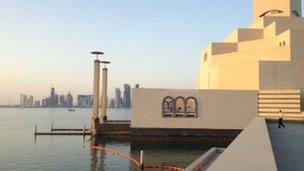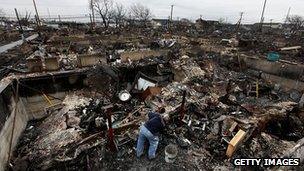Harrabin's notes: Kyoto rumbles on
- Published
- comments

Qatar was built without a sea level rise in mind
The clanking Kyoto climate Protocol lurched into its terminal phase in Doha, dragged down by complexity and self-interest to the last. Soon it will be replaced by a new model.
Since the protocol was constructed 15 years ago, greenhouse gases have risen relentlessly.
Authorities warn that on current trends the Earth is, at best estimate, likely to exceed the 2C temperature rise agreed as a limit by all governments.
Some think the climate will heat by as much as 6C.
Shale gas optimists hope that a global gas boom will provide a quick transition to a cleaner economy, but their strategy looks unlikely to lead to emissions cuts , externalon the scale science says is needed.
'Sacrifice Brooklyn'
Others conclude that the UN climate process is useless and should be scrapped.
The oil giant Exxon, which previously denied climate change, is now saying that politics can't fix it: better adapt instead.
But scientists warn there is no credible scenario for adapting to temperatures at the upper limit.
Already, with a global temperature rise of 0.8C, even the US faces challenges. President Obama has asked for $60bn in the aftermath of "Superstorm" Sandy and New York may need to sacrifice Brooklyn to save Manhattan, external if a hurricane strikes again.
Imagine how Niger will cope. Or Bangladesh, where the delta cannot be protected by sea walls without unimaginable expense. Or Nauru in the South Pacific.
The Doha conference did take a small but surprising step towards acknowledging that rich nations may have an obligation to compensate poor nations which suffer irreparable damage from climatic change.
But all the nations in Doha agree that cuts need to be deeper and faster, preferably carried out by someone else. They don't doubt the mainstream science on climate change - indeed their governments helped to write it, external.
Streamline Kyoto
It's the will to succeed in this unprecedented co-operative endeavour that's leading to the Son of Kyoto - O'Kyoto, Al Kyoto, bin Kyoto, McKyoto - whatever it will be called.

"Superstorm" Sandy devastated some New York neighbourhoods
By December 2015 all the world's nations are due to have agreed a comprehensive deal to co-operate on an equal footing to tackle climate change. No more will China be able to criticise the US when its own current emissions have overtaken America's. (Although this is not true for cumulative emissions.)
No, the new deal will have to be fair to all. It will streamline the chaotic Kyoto system which bolted on branches as nations discovered one new unfairness after another: you chopped more trees; my industry collapsed so I lost money but saved carbon emissions; your cows belch more; you buy the stuff I make then blame me for the CO2 emissions.
The KP, as it's known, ended with four separate financial tracks that befuddled most climate diplomats. The EU delegation head told me even the EU's negotiating capacity was stretched to breaking.
How would Mali fare? Or Somalia, whose chair I borrowed for the final Doha plenary because many African delegates could not afford to postpone their flights. Others were slumbering at their desks after trying to negotiate single-handed round the clock.
China
This baffling thicket of rules will be swept away in the new treaty. But let's survey the task ahead. The world's nations will have to be ranked on a sliding scale with the richest polluters expected to cut most and contribute most cash towards helping the poor get clean energy and adapt to climate change. In future they may also be expected to compensate people if their land goes under the waves.
Imagine the job of negotiating that all-in-together treaty, which has been demanded by the US since it pulled out of Kyoto complaining that it would not accept targets unless rival China did too.
Meanwhile China is already consolidating its position for O'Kyoto. With millions of people in poverty, it expects to be treated as a developing nation. It expects not to be blamed by other nations for emissions it makes on their behalf.
Diplomats have just spent a fractious exhausting fortnight doing the housekeeping on the KP without any substantial new commitment to cutting emissions. Yet within three years a new deal is scheduled. Really?
'Inadequate' pace
The association of parliamentarians focusing on the environment, Globe, external, does not underestimate the scale of the task, but counsels against despair.
It will soon report that 32 out of 33 major economies have, or will have, significant legislation on climate or energy. The laws achieve low-carbon growth, greater energy security and a reduction in greenhouse gases and local air pollution.
In Doha the Dominican Republic took a lead for developing countries by pledging to cut its emissions. But even Globe admit that the overall pace of change is totally inadequate.
Some blame politicians but they underestimate the scale of this political task. In the UK the Chancellor has already secured a review of climate laws because they impose short-term costs on people already struggling to pay energy bills. And the big incumbent fossil fuel firms insist that they are allowed to extract all their reserves even though the International Energy Agency warns that the fuels can't be burned without wrecking the planet.
So who is winning the climate battle? Well, this year's talks were hosted by Qatar, which has the highest per capita emissions in the world. Did it pledge to cut emissions? No. Offer financial help to the poor? No.
Next year's talks are being hosted by Poland, which has weakened EU ambition on emissions cuts and wreaked concessions to be allowed to burn more coal.
Little wonder that some people are gambling that the Earth proves more resilient to CO2 than the vast majority of scientists believe.
Follow Roger on Twitter @rharrabin, external
- Published4 December 2012
- Published12 September 2012
- Published15 August 2012